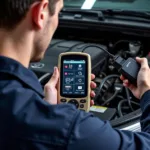A dead car key can leave you stranded and frustrated. Whether your key fob is unresponsive, the battery is drained, or the key itself is damaged, understanding the potential causes and solutions is crucial. This guide provides a comprehensive overview of common car key problems and how to repair a dead car key to get you back on the road.
Understanding Car Key Components
Before diving into repairs, it’s helpful to understand the basic components of a modern car key:
- Key Fob: The plastic casing containing the electronics for remote functions like locking, unlocking, and starting your car.
- Transponder Chip: A small electronic chip embedded in the key that communicates with your car’s immobilizer system for security.
- Battery: Powers the key fob’s remote functions.
- Key Blade: The metal part inserted into the ignition cylinder for traditional starting.
Common Causes of a Dead Car Key and Troubleshooting Tips
Identifying the root cause of your car key issue is the first step towards a solution. Here are some common culprits:
1. Dead Key Fob Battery
Symptoms: Key fob buttons don’t work, but the key still starts the car.
Troubleshooting:
- Check the Battery: Open the key fob (usually a small compartment) and inspect the battery for corrosion or damage.
- Replace the Battery: Use a compatible replacement battery (often a CR2025 or CR2032) and ensure it’s inserted correctly.
- Test the Key Fob: After replacing the battery, test all key fob functions to confirm they are working properly.
2. Damaged or Desynchronized Key Fob
Symptoms: Key fob buttons inconsistently work or don’t work at all, even with a new battery.
Troubleshooting:
- Check for Physical Damage: Examine the key fob for cracks, loose buttons, or water damage.
- Resynchronize the Key Fob: Consult your car’s owner’s manual for instructions on resynchronizing or reprogramming the key fob to your car. This process often involves a specific sequence of button presses or using the ignition cylinder.
3. Faulty Transponder Chip
Symptoms: Key turns in the ignition but the car won’t start. The immobilizer system may be preventing the engine from starting.
Troubleshooting:
- Check Immobilizer Warning Lights: Look for a flashing key symbol or security light on your dashboard, indicating an immobilizer issue.
- Professional Reprogramming: Transponder chip issues typically require professional diagnosis and reprogramming using specialized equipment. Contact a qualified locksmith or dealership.
4. Damaged or Worn Key Blade
Symptoms: Key is difficult to insert or turn in the ignition cylinder.
Troubleshooting:
- Inspect for Wear and Tear: Check the key blade for bending, excessive wear, or damage.
- Key Cutting: If the blade is worn, you’ll need a new key cut. A locksmith or dealership can cut a new key based on your existing key or your car’s VIN.
Can I Repair a Car Key Myself?
While some car key repairs like battery replacement are relatively simple, others require specialized knowledge and equipment.
DIY Repairs:
- Battery Replacement: Straightforward and can be done at home with the right tools and a replacement battery.
- Key Fob Resynchronization: Some cars allow for DIY resynchronization following instructions in the owner’s manual.
Professional Repairs:
- Transponder Chip Issues: Require professional reprogramming and specialized equipment.
- Damaged Key Blade: Key cutting for modern cars often involves intricate designs and requires professional tools and expertise.
- Extensive Key Fob Damage: Internal damage to the key fob often necessitates replacement.
Tips for Preventing Dead Car Key Issues
- Regular Battery Replacement: Replace your key fob battery every 2-3 years as a preventative measure.
- Protect Your Key Fob: Avoid dropping your key fob, exposing it to extreme temperatures, or getting it wet.
- Address Issues Promptly: Don’t ignore intermittent key fob issues. Addressing them early can prevent more serious problems.
Car Key Repair Costs
Car key repair costs vary depending on the issue, car make and model, and the service provider. Here’s a general idea:
- Battery Replacement: $5 – $20
- Key Fob Resynchronization: $50 – $150
- Transponder Chip Reprogramming: $100 – $300
- Key Blade Cutting: $50 – $150
- Key Fob Replacement: $150 – $500+
“It’s essential to choose a reputable locksmith or dealership for your car key repairs,” advises John Smith, Senior Automotive Technician at CarRepairOnline. “They have the expertise and equipment to ensure your key is properly repaired and programmed to your vehicle.”
Conclusion
A dead car key can be a major inconvenience, but understanding the potential causes and solutions can help you get back on the road quickly. While some repairs like battery replacement are manageable DIY tasks, more complex issues require the expertise of a qualified locksmith or dealership. Remember to take preventative measures and address issues promptly to avoid being stranded with a dead car key.
FAQs About Dead Car Keys
Q: Can a dead car key battery drain my car battery?
A: No, a dead key fob battery will not drain your car battery. The two batteries are separate systems.
Q: How long do car key batteries last?
A: Car key batteries typically last between 2-3 years, depending on usage and environmental factors.
Q: Can I jumpstart my car with a dead key fob battery?
A: If your key fob has a physical key blade, you can still start your car normally. If your car has a push-button start, you may need to consult your owner’s manual for instructions on starting the car with a dead key fob battery.
Q: Can I get a replacement car key made at any hardware store?
A: While some hardware stores may cut basic car keys, modern car keys with transponder chips and intricate designs often require specialized equipment and expertise found at locksmiths or dealerships.
Q: My car key is bent. Can it be fixed?
A: A slightly bent car key may be straightened by a locksmith. However, severely bent or damaged keys may need to be replaced.
For more information on specific car key issues, you can explore our other helpful resources:
If you’re experiencing issues with your car key and need assistance, don’t hesitate to contact us. Our team of experts is available 24/7 to provide support and guidance. You can reach us via WhatsApp at +1(641)206-8880 or email us at [email protected].


